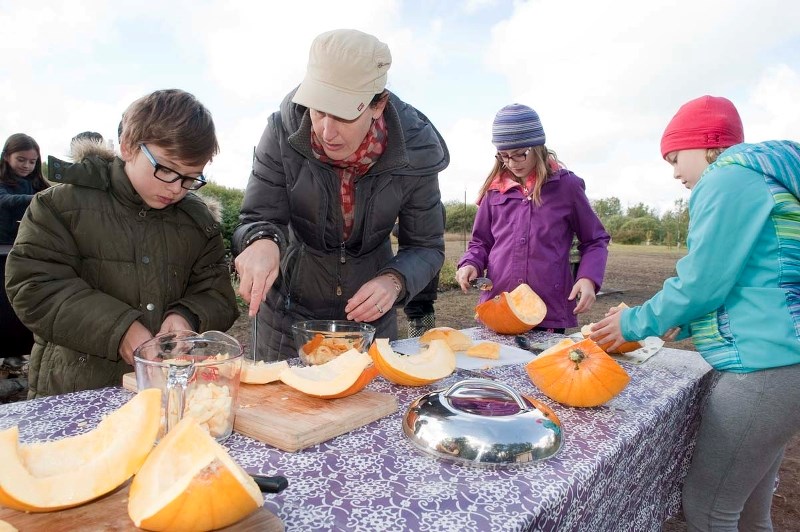Not every student gets to go to school in a place full of grass, trees, mud and potatoes.
But a small group of Muriel Martin students got all that plus frogs, snow, wasps and a dog this week as part of a new wilderness school project put on by a St. Albert teacher.
About 55 Grade 4 students from Muriel Martin spent last week at a 70-acre farm near Sandy Beach as part of Monique Waters' Wilderness School project.
Waters, a teacher at Muriel Martin, ran the school as part of a master's research project on experiential education she's doing through the University of B.C.
Waters says traditional classroom instruction is very theoretical, with topics clearly segregated into different subjects.
"In life, generally, things aren't so segregated," she says – making soup might involve math, chemistry and measurement, for example. It's also tough for students to actually relate to the abstract problems they have in their textbooks.
Experiential learning is an educational theory that people learn better through doing, Waters says. It emphasizes outdoor environments, environmental education and hands-on activities.
Waters has previously taken classes to this farm (which is her family's) on day trips, and decided to do this weeklong trip as part of a case study on experiential education.
"It allows me to cover more curriculum at once," she says, and gives students a chance to apply their lessons.
"They're retaining more because they're doing. They can relate (lessons) to something that's really relevant to them."
Running an outdoor school includes some logistical challenges. The site has no running water and just one toilet, for example (they brought in water and port-a-potties), and was blanketed in snow on Monday.
"We built snowmen on Monday," Waters says.
But the site itself is also somewhat appropriate for a classroom: it was once the site of Lac Ste. Anne's Stettin School.
"It's kind of neat seeing how this used to be a school and here we are having our school here," Waters says.
Wild classroom
The classroom has a bit of a wild, playground atmosphere to it on Wednesday. One group is in a Quonset hut full of desks crafting frames from sticks for interpretive nature signs, while another is studying bird and wasp nests. Others are playing soccer or cooking pumpkin soup. Still others are playing with Ralph the dog, who is spoiled for choice when it comes to sticks to fetch.
Waters has mixed classroom lessons into each activity. The kids making soup have to work as a team to harvest vegetables from the nearby garden, measure ingredients and calculate how to scale up the recipe to feed the whole class. Nature walks include lessons on how to identify saskatoons and their importance to the First Nations, as well as looks at wasp nests and anthills.
The kids are having a blast despite the cold – one pulls somersaults as she walks, while another gushes over catching a tiny boreal chorus frog.
Student Raegan Schulha helps chop and stir boiling pumpkin for the soup.
"It's really fun," she says of cooking, although picking the basketball-sized pumpkins was a challenge.
"They were very heavy!"
Schulha says she's been researching animal nests and going on nature walks, one of which involved an amazing forest where everything was covered in moss.
"If we were really quiet, we couldn't hear a thing," she says.
"It reminded me of The Hobbit."
Fellow teacher Patricia Toth says her students are excelling in this environment, especially the more active ones, as they're no longer confined to a desk all day.
"I think the concepts they've learned here in these hands-on situations will be ones they remember a lot more than things they learn out of a book," she says.
"This is definitely something I would like to do again, and I think it's something all classes and all ages of kids can benefit from."
Waters says she plans to do more of these farm-themed lessons later in the year. One looming challenge will be to get her students used to indoor learning when they go back to school next week.
Wilderness School
Muriel Martin teacher held class outdoors on the farm this week as part of a research project into experiential education. <br /><br />Visit wildernessschool.weebly.com for more on the project.




